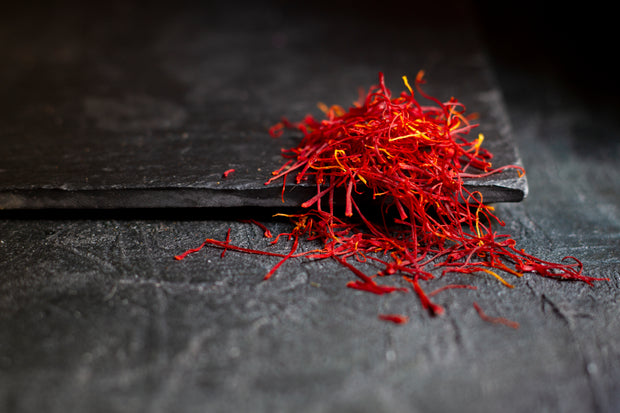The versatile use of saffron – more than just a spice

Saffron, often referred to as "red gold," is one of the world's most precious and expensive spices. But its importance isn't limited to cooking. Saffron also has a wide range of uses in medicine and industry. This article highlights saffron's most important uses and answers frequently asked questions—ideal for anyone interested in purchasing saffron or learning more about its benefits.
1. Culinary use of saffron
In fine cuisine, *saffron* is an indispensable aromatic spice. Just a few strands impart a unique aroma and an intense yellow-gold color to dishes.
Typical applications in the kitchen:
- *Paella:* Classic Spanish rice dish with saffron
- *Risotto alla Milanese:* Italian rice dish with saffron and Parmesan
- *Desserts:* Saffron milk, cakes, pudding and ice cream
- *Drinks:* Saffron tea, golden milk or lemonades with saffron extract
A tip for use: Soak the saffron threads in warm liquid (e.g. Soak in water, milk, or broth . This will allow the color and flavor to develop better.
2. Medicinal effects of saffron
Saffron is not only a spice but also a traditional medicinal herb used in many cultures for centuries. Modern scientific studies confirm its health-promoting properties .
Proven health benefits:
- *Mood-enhancing:* Supportive in cases of mild depression
- *Stress-relieving:* Promotes relaxation and inner balance
- *Sleep-improving:* Can positively influence sleep quality
- *Immune system strengthening:* Contains antioxidants such as crocin and safranal
- *Appetite suppressant:* Can help with weight control
- *Hormone regulating:* Especially helpful for PMS and during menopause
For medicinal purposes, standardized extracts (e.g. (e.g., in capsules) is recommended. If you have pre-existing medical conditions, you should consult a doctor before taking the medication.
3. Industrial and cosmetic use of saffron
Saffron is also valued in industry for its intense color and antioxidant properties.
Typical areas of application:
- *Cosmetics:* Use in creams, serums and face masks for skin lightening and wrinkle reduction
- *Perfumery:* Component of exclusive fragrance compositions
- *Food industry:* Use as a natural colorant in baked goods, cheese, confectionery and beverages
Certified organic saffron is particularly in demand in natural cosmetics and premium foods.
Conclusion
Saffron is far more than an aromatic spice. Its effects extend beyond the culinary world to include health, beauty, and industry. Anyone considering purchasing saffron should pay attention to its quality, origin, and processing. Only genuine and purely processed saffron unfolds its full potential—whether in risotto, dietary supplements, or natural cosmetics.
Frequently Asked Questions about Saffron (FAQ)
You can purchase high-quality saffron from certified online shops, pharmacies, or spice dealers. Look for organic certifications, indications of origin, and independent laboratory analyses.
The price is usually between €5 and €30 per gram, depending on quality, origin and purity.
Real saffron consists of long, dark red threads with an intense aroma. When soaked in warm water, it slowly turns the liquid golden yellow. Powdered versions are often diluted – beware of fakes.
Studies show that saffron can have a mood-enhancing effect by influencing serotonin levels. It is particularly suitable for mild depression or to support stress.
Yes, saffron can reduce cravings and thus support weight management.
The recommended daily dose is a maximum of 1 to 1.5 grams. An overdose (from about 5 grams) can be harmful to health.
Saffron threads should be soaked in warm liquid before adding them to a dish. This allows the aromas to dissolve better and the characteristic color to develop optimally.
In small amounts (e.g., in seasoning), saffron is generally safe. However, larger doses should be avoided during pregnancy, as they may induce labor.
Yes, saffron extracts are a component of numerous skin care products, especially natural cosmetics. It has antioxidant properties and helps brighten the complexion.
Yes, saffron is used as a natural, biodegradable colorant in many high-quality products – especially organic ones.
For more information about saffron
Chemical composition of saffron
How do you recognize real saffron?




